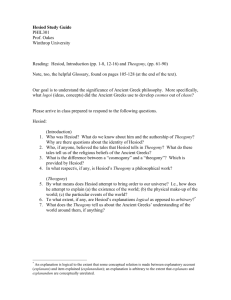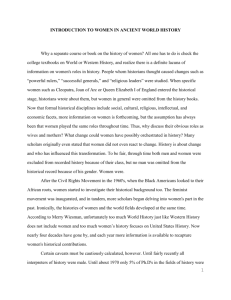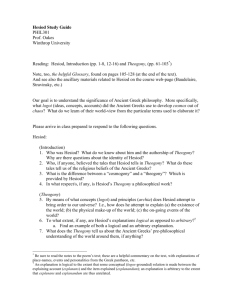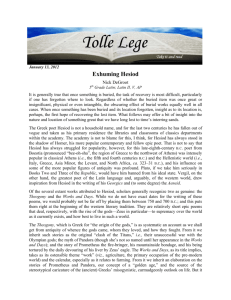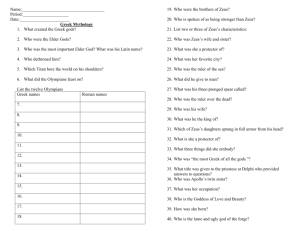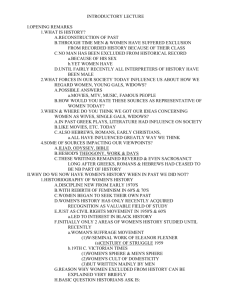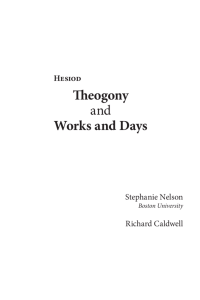Precursors Study Guide PHIL301 Prof. Oakes Winthrop University
advertisement
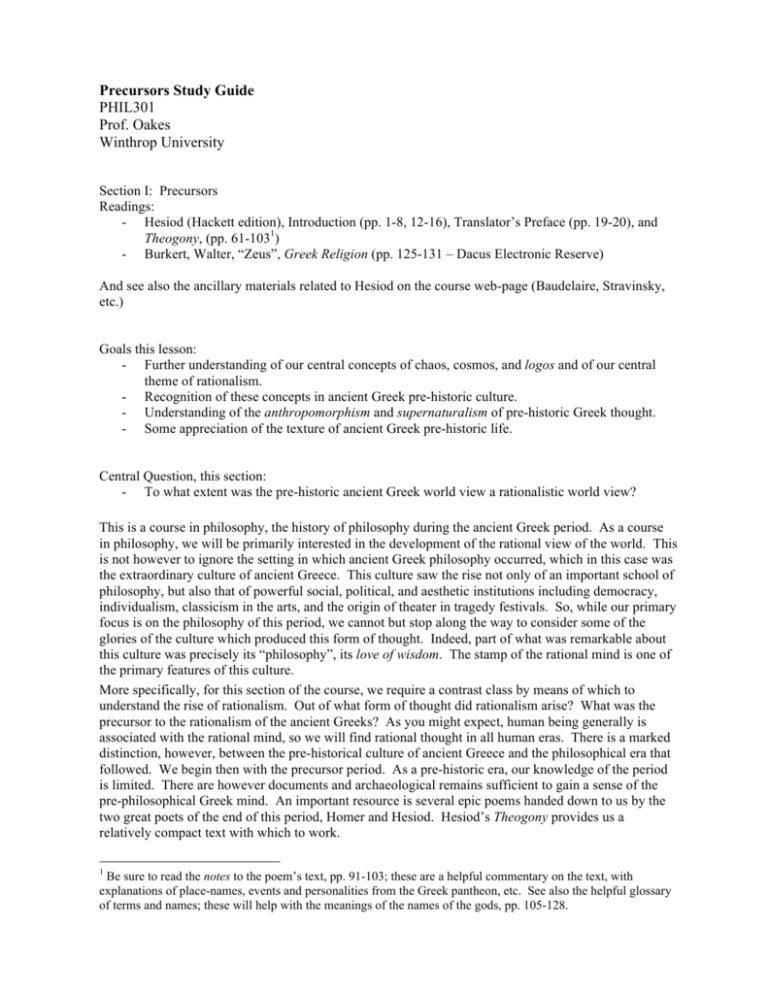
Precursors Study Guide PHIL301 Prof. Oakes Winthrop University Section I: Precursors Readings: - Hesiod (Hackett edition), Introduction (pp. 1-8, 12-16), Translator’s Preface (pp. 19-20), and Theogony, (pp. 61-1031) - Burkert, Walter, “Zeus”, Greek Religion (pp. 125-131 – Dacus Electronic Reserve) And see also the ancillary materials related to Hesiod on the course web-page (Baudelaire, Stravinsky, etc.) Goals this lesson: - Further understanding of our central concepts of chaos, cosmos, and logos and of our central theme of rationalism. - Recognition of these concepts in ancient Greek pre-historic culture. - Understanding of the anthropomorphism and supernaturalism of pre-historic Greek thought. - Some appreciation of the texture of ancient Greek pre-historic life. Central Question, this section: - To what extent was the pre-historic ancient Greek world view a rationalistic world view? This is a course in philosophy, the history of philosophy during the ancient Greek period. As a course in philosophy, we will be primarily interested in the development of the rational view of the world. This is not however to ignore the setting in which ancient Greek philosophy occurred, which in this case was the extraordinary culture of ancient Greece. This culture saw the rise not only of an important school of philosophy, but also that of powerful social, political, and aesthetic institutions including democracy, individualism, classicism in the arts, and the origin of theater in tragedy festivals. So, while our primary focus is on the philosophy of this period, we cannot but stop along the way to consider some of the glories of the culture which produced this form of thought. Indeed, part of what was remarkable about this culture was precisely its “philosophy”, its love of wisdom. The stamp of the rational mind is one of the primary features of this culture. More specifically, for this section of the course, we require a contrast class by means of which to understand the rise of rationalism. Out of what form of thought did rationalism arise? What was the precursor to the rationalism of the ancient Greeks? As you might expect, human being generally is associated with the rational mind, so we will find rational thought in all human eras. There is a marked distinction, however, between the pre-historical culture of ancient Greece and the philosophical era that followed. We begin then with the precursor period. As a pre-historic era, our knowledge of the period is limited. There are however documents and archaeological remains sufficient to gain a sense of the pre-philosophical Greek mind. An important resource is several epic poems handed down to us by the two great poets of the end of this period, Homer and Hesiod. Hesiod’s Theogony provides us a relatively compact text with which to work. 1 Be sure to read the notes to the poem’s text, pp. 91-103; these are a helpful commentary on the text, with explanations of place-names, events and personalities from the Greek pantheon, etc. See also the helpful glossary of terms and names; these will help with the meanings of the names of the gods, pp. 105-128. Precursors Study Guide Hesiod’s Theogony (Introduction, Translator’s Preface) The introduction will tell you some of what we know about how Hesiod’s Theogony might have come into existence, who Hesiod might have been, and the culture that he might have lived in. As you might imagine, details about events taking place just at the beginning of recorded history are hard to come by. Think about the following questions as you read the introduction: 1. Who was Hesiod? What do we know about him and the authorship of Theogony? Why are there questions about the identity of Hesiod? 2. Who, if anyone, believed the tales that Hesiod tells in Theogony? What do these tales tell us of the religious beliefs of the Ancient Greeks? Although there is uncertainty as to just who or what Hesiod was, we will adopt the convention of referring to “him” as a single person – if only to simplify our discussion. At times, it may become appropriate to return to the question of the exact authorship of Theogony. It is important in any case to remember that “Hesiod” was a poet, not a philosopher. Despite this fact, we can raise questions about the philosophical significance of his poem. The introduction will thus also tell you something about what kind of work Hesiod’s Theogony is. So consider these questions, too, as you read: 3. What is the difference between a “cosmogony” and a “theogony”? Which is provided by Hesiod? 4. In what respect/s, if any, is Hesiod’s Theogony a philosophical work? What is the significance of its being a poem, first and foremost? Our central concept is that of rational order. We seek an account of the rise of rationalism in ancient Greek philosophy. While the pre-historic, pre-philosophical period in ancient Greece will provide a contrast with the rationalist epoch to follow, it is not itself of course an era free of all rational thought. Our task then is to characterize such rationalism as we find in the pre-historic period and distinguish it from that to follow. To this end, we employ two concepts, anthropomorphism and supernaturalism. We define these as follows: - Anthropomorphism: representing a (presumably) non-human entity or phenomenon in human form or terms; from the Greek anthropos, man, and morphos, form. - Supernaturalism: reference to, belief in, or especially explanation of natural phenomena in terms of non- or extra-natural beings, powers, or phenomena; from the Latin super, meaning above or beyond. While the term may be new to you, you are already familiar with the notion of anthropomorphism. Any time you think of some inanimate object as having human-like qualities, you anthropomorphize that object – i.e., give it human form. We often joke about such things, as when we call our shoe-lace “stupid” for tripping us. Some of us name our cars and boats and imagine them to have personalities, of a sort. Any time we attribute emotion or thought or feeling to things that in fact lack those qualities, we anthropomorphize our world. The term ‘supernatural’ is also likely familiar to you, and we use it in much the sense you are used to: the super-natural is any force or phenomenon or principle that exist outside of this, the natural world. Gods, deities, generally are understood to be supernatural beings. We also refer to supernatural beings such as ghosts, demons, and guardian angels. More generally, note that a supernatural account of some natural-world phenomenon asserts that the nature or behavior of this world is to be explained by reference to other-worldly things. If you believe, for example, that little gremlins are responsible for stealing your socks randomly from the drier, then to the extent that the gremlin is not a natural-world entity, you appeal to a non-natural-world phenomenon to explain things in this world. Any explanation going beyond this world to a supernatural world renders the workings of this world supernatural. p. 2 Precursors Study Guide Anthropomorphism and supernaturalism distinguish the pre-historic Greek mind from the more rational mind that follows. While the philosophical era will not be entirely free of these ways of thinking – indeed they will remain powerful, as they do today – it will be marked by a distinct effort to depart from these ways of understanding the order of the world. The first philosophers will seek rational principles that are not re-imaginations of human form, principles that focus not on a divine order external to our world but on elements of this world itself. Naturalism, as opposed to supernaturalism, will characterize the beginnings of philosophy. Our present purpose is however to characterize the world preceding Greek philosophy. Read the Theogony with these sets of ideas in mind. (Theogony) Hesiod’s Theogony can tell us much about the world view (cosmology) of the pre-historic ancient Greeks. Think about the general principles that Hesiod uses to explain the world and its origins. Recall that an explanatory principle (arche) is any general idea that we appeal to in explaining something: what common ideas appear in Hesiod’s explanations? 5. By means of what concepts (logoi) and principles (archia) does Hesiod attempt to bring order to our universe? I.e., how does he attempt to explain (a) the existence of the world; (b) the physical make-up of the world; (c) the on-going events of the world? To speak of the “logic”, then, of Hesiod’s world is to speak of the general terms and principles that he uses to describe it and its general operation. As we consider the logic of this world, we can raise the question of the extent to which Hesiod’s is a logical world. Does every feature of our world have a clear and complete explanation on his account? 6. To what extent, if any, are Hesiod’s explanations logical as opposed to arbitrary?2 Is his a completely or “maximally” logical world? What are some examples of logical explanations, if any? What are some examples of arbitrary explanations, if any? Given our definitions of the terms, it should also be plain to what extent Hesiod’s worldview is anthropomorphic and supernaturalistic. 7. In what respects does the Theogony present an anthropomorphized world? What are some examples of anthropomorphism in the poem? 8. What does it mean to say that Hesiod’s account of our world is supernaturalistic? What are some supernaturalistic principles that Theogony appeals to? Burkert: “Zeus” Renowned religious scholar Walter Burkert gives us some further insight into the nature of the Greek religious tradition informing the ancient Greek mind in the pre-historical era. From bits and pieces of ancient poems, artwork, and architecture, he reconstructs central traditions surrounding the ancient Greek pantheon, including those pertaining to its chief god, Zeus. Burkert begins with some discussion of the name ‘Zeus’ itself. The word is “etymologically transparent,” meaning that we can determine the meaning behind the name, how the name came to be imbued with the meaning that it had for the Greeks. The meaning of the word ‘Zeus’ gives us hints as to the character of the god so-named. Note, here, too, that religious traditions do not spring up whole-cloth in a given culture; rather, religious traditions are like other customs and practices, shared with and borrowed from other cultures. As you read, think about what it would be like to grow up and live in a culture in which Zeus was one of your gods. 2 See our introductory discussion of logic for a complete explanation of this term. An explanation is logical to the extent that some conceptual (logos-grounded) relation is made between the explaining account (explanans) and the item explained (explanandum); an explanation is arbitrary to the extent that explanans and explanandum are thus unrelated. p. 3 Precursors Study Guide 9. General theology: what do we learn about ancient Greek religious traditions from Burkert’s account of Zeus? Note the specific roles played by the god, imbuing the given institution or phenomenon with divine significance and individual character. Think about what it would be like to live in a culture in which Zeus was a deity: What is Zeus like? What images are associated with him? What social institutions or practices are associated with Zeus? What abstract principles are associated with Zeus? What role does he play in our understanding of the world? What does Zeus reveal about our understanding of the world? 10. Cosmos-specific: more specifically, what role does Zeus play in world order? In what ways does Zeus confer order on the universe? How is rational order characterized in its association with Zeus? What does the last sentence of the section on Zeus mean, exactly (p. 131)? 11. What is justice, for the pre-historic Greek? What does Burkert mean by saying that Zeus is not himself just? If Zeus is not himself just, how does he decide what is just? Temple of Olympian Zeus, Athens, Greece Note the colossal scale of the temple; its end would have filled this image. Part of the challenge of philosophy is making sense of a variety of information. We are provided with any number of thoughts, ideas, impressions and seek to identify – if not actually create – the organizing principles unifying these many things. Burkert himself summarizes his own remarks with his final sentence: “Zeus is the world as a whole, and especially the thinking fire which pervades everything, forms everything, and holds everything in limits.” Part of your process is to re-compose, re-synthesize such thoughts, taking the several points made in a passage such as this and re-assimilating them in your own words. How would you summarize his remarks on Zeus and his significance for ancient Greek thought? Our central question is the rationality of ancient Greek thought. An examination of Hesiod’s Theogony can reveal much about the ancient Greek mind. We have seen that the pre-historic Greek world is organized along anthropomorphic and supernaturalistic lines. To what extent, now, can we say that that world was rational? Refer to our definition of rationalism to answer this question. 12. To what extent is the pre-historic ancient Greek world a rationalistic world order? p. 4
